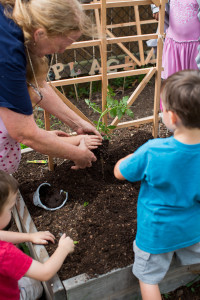9/30/2015
School gardening programs have been sprouting up across the nation and the University of Tennessee’s Early Learning Center is pleased to see the trend. Many studies have looked at the impact of school gardens and their connections to curriculum, particularly for science, mathematics, language arts, nutrition, geography, literature, and health scienc e, along with skills acquisition (Williams & Dixon, 2013). The educators at the ELC have already seen the benefits since implementing our own gardening program almost 4 years ago.
e, along with skills acquisition (Williams & Dixon, 2013). The educators at the ELC have already seen the benefits since implementing our own gardening program almost 4 years ago.
Since the addition of gardens at both ELC locations, several garden-to-table opportunities have arisen. Children work with their teachers and our gardener, Barbara, to grow food for snacks and lunches, often helping to choose the types of fruits, vegetables, and herbs to be planted. The teachers at the ELC have noticed the benefits of these practices. “Something that we have noticed as our children have had the opportunity to eat the vegetables and herbs that they have planted, cared for, and harvested is that they are much more willing to try them. Some of our most reluctant eaters are excited to try a newly harvested food!” said Katie Denton-Walls, a preschool teacher.
Gardens are embedded in the playscapes at the ELC’s two locations and offer a multitude of experiences for young children to explore how food grows, where their food comes from, and the joy of cooking and eating food they grew themselves. It is not uncommon to see a group of toddlers trying a freshly cut cabbage, or preschoolers eating ripe tomatoes on the porch outside their classrooms.
Children frequently harvest fruits and vegetables and bring them to one of the cooks for preparation or do some research to learn how to prepare the foods themselves. Dani Rose Thibus, former ELC kindergarten teacher, reflects on an experience at the beginning of growing their garden. “One year, we had these tiny, round, green things growing on a vine. Even the teachers weren’t sure what they were! So, the children and I had to look it up based on the characteristics we observed. They turned out to be tomatillos and we learned that some salsas are made with them, so that’s what we did.”
Recently, while tending to their garden, a group of older toddlers and their teacher, Samantha Deal, noted that something interesting had shown up in a flower box. Samantha was pretty sure that the vine they had planted a year or so ago was simply ornamental, but to her surprise, there were two purple sweet potatoes in their garden. The children immediately suggested that they give the potatoes to one of our cooks, George, for preparation so they could try the purple sweet potatoes. George cooked the sweet potatoes and several children sat down at the table to try them. “I thought they would be pink!” said one child. “It’s really yummy!” said another. Samantha reflects on the discovery: “The whole experience after finding the potatoes was led by the children and that’s really special and meaningful for them. They have deep ownership of the garden, and for them to be able to find a product from it, have it prepared for them, and then get to eat it with such a short turnaround time is very powerful.”
Parents are excited about the garden-to-table efforts going on at the ELC also. They are impressed with the connections their children are making regarding growing food and mealtimes. “I think it’s important that they (children) learn about how things come to be on their plate and into their tummy”, said Betsy Dalton, in regards to her family’s participation in planting the Sensory Garden on the Lake Avenue playscape.
 Gardening with young children is an exciting and rewarding process for all involved and we are proud to offer such rich experiences at the Early Learning Center. We are excited to be able to share more about our journey in gardening and nature-based practices at our annual summer conference, The Early Learning Institute this summer- we hope you will join us! Click here to learn more about the ELI!
Gardening with young children is an exciting and rewarding process for all involved and we are proud to offer such rich experiences at the Early Learning Center. We are excited to be able to share more about our journey in gardening and nature-based practices at our annual summer conference, The Early Learning Institute this summer- we hope you will join us! Click here to learn more about the ELI!